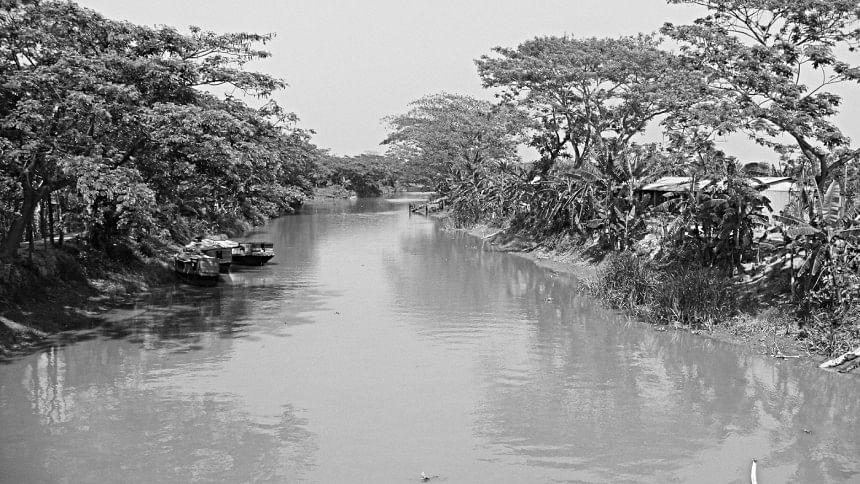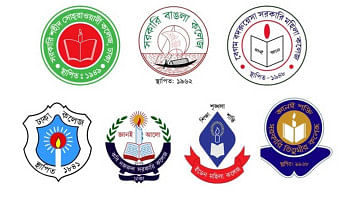Jibanananda and Barishal

What is Barishal known by? One hundred years back, the unfailing answer was "rice and river." Half a century ago, the answer might have been a political name- Sher-e-Bangla A. K. Fazlul Huq. But now the answer is unfailingly a name from the poetical world and he is our poet Jibanananda Das. Several times I have experienced this as a pleasurable reality. In 2008 I attended a seminar at Tripura university in India. Every time I met a stranger there and said that I was from Barishal, the first response from him or her was a word of sheer wonder- 'Wow! You are from the land of Jibanananda Das!' This happened not in India only. In Australia, Malaysia, Nepal, Saudi Arabia- wherever I met a Bangla speaking unknown person, most often it was a common pleasurable greeting for me- 'Wow! You hail from the land of Jibanananda Das!' These experiences solidify my belief that Jibanananda Das is now simply the identity mark of Barishal.
The status of Jibanananda as the identity mark of Barishal is obviously a making of his works, especially of poetical works. Some of his poems have poeticised certain topographical names of Barishal with so astonishing success that reading those poems always gives the reader a sensation of journeying through the landscape and the lush greenery of Barishal. The reader must feel that the poem is a picture of no other place than Barishal as the topographical name has pinned it down to Barishal. Among those names the most prominent one is Dhansiri, a name of a river.
Before Jibanananda mentioned the name in his poem, nobody in the world knew a river called Dhansiri, because, if truth be told, there existed no river by this name in this Earth. The actual name of the river was Dhansiddha. It is only a 7-kilometre long narrow river in the present district of Jhalokathi, connecting a canal called Gabkhan to a narrow river called Jangalia of Rajapur. At its southernmost end there stands the Upazila town of Rajapur on its bank. It is widely believed that the river was named Dhansiddha because the water-flow from the paddy-boiling vessels of the nearby villages, Hailakathi and Saichlapur, actually gave birth to this river. In all survey maps of the government, the name of the river is still Dhansiddha, not Dhansiri. It was Jibanananda who poeticised the name and transformed it into Dhansiri. Now it is the most melodious and lyricised of all the river-names in Bengal. And it is no longer a mere name of a river, it is a poetical identity of Barishal.
Dhansisri is not the one and only example of poetic transformation of topographical names of Barishal in the hands of Jibanananda. The poem, known as "Abar ashibo firey" I shall return again), which has uplifted the status of Dhansiri almost to the mythical level, itself records at least two other examples of poetic transformation of names by Jibanananda and directly attaches the topography of Barishal to the beauty of Bengali poetry. One of the two examples involves the river Jangalia. The relevant lines of text read "I'll come lovingly again to Bengal's rivers, fields, farmlands,/ To the green wistful shores of Bengal lapped by Jalangi's waves" [Translation by Fakrul Alam]. The translation by Clinton B. Seely reads- "Once again I'll come, smitten by Bengal's rivers, fields, to this/ Green and kindly land of Bengal, moistened by the waves of the Jalangi." It is noticeable that Jalangi has been treated and translated as the name of a river in both the translations. But is there any river called Jalangi in Bengal? There is none and there was none even in our historical past. Actually, the name of the river is Jangalia and it is still a living river at Rajapur upazila of Jhalokathi district. Jangalia and Dhansisri have met at Baghri bazar of Rajapur. When Jibanananda used to travel to Kolkata, his steamer on the river Dhansiri took a right turn to the west at the point of Baghri and then he had every time a glimpse of the rippling water of the river Jangalia flowing to the east. It is in every way valid to imagine that the bewildering beauty of that river, whose gentle waves created by the propeller of the steamer lapped against the calm banks on both sides, had an everlasting impression in the poetic self of Jibanananda. He duly planned to immortalise the river in the lines of his poem. But the name of the river obviously sounded a bit unpoetical. So he moderately lyricised it and we got the immortal poetic name Jalangi, in place of Jangalia. This is how again a river of Barishal made its permanent place in an immortal poem of Bangla literature to represent Barishal, as well as the beauty of Bengal.
The third example of the name of a river of Barishal poetically transformed by Jibanananda is that of the little river Ruposhia. The Ruposhia is a small tributary of the Dhansiri at its northern end. It is presumable that from the deck of the steamer to Kolkata, Jibanananda enjoyed the panorama of Ruposhia with his mesmerised poetic eyes. Jibanananda could not afford to leave the name of this little captivating river unmentioned in his immortal poem which celebrates and elevates two other adjacent rivers Dhansiddha and Jangalia to a sublime status. But, as usual, here also we see that the poet has made a slight change in the name of the river. He has mentioned it as Rupsha, not as Ruposhia. The text in Bengali reads- "Rupshar ghola jolay hoito kishor ek shada chera pale/ dinga baye:" in Fakrul Alam's translation- "In the muddy Rupsha river some boy will be rowing a boat with torn white sails." This time the change in the name, however, does not seem to be due to any unpoetical harshness of the sound, rather, the change might be simply for the sake of metre. The name Ruposhia does not agree with the metre of the line and therefore the poet found it worthwhile to ensure a perfect metrical agreement by dropping one or more syllables off the name. Thus Ruposhia became Rupsha simply for the sake of prosodic correctness. Nevertheless, there are people who like to identify the river with the Rupsha of Khulna district. But that is unlikely because the deep and wide river Rupsha of Khulna is not supposed to be "muddy" and as the Rupsha is a river of mighty current, "a boy" is not expected to have the courage to row a boat in that river "with torn sails."
Now, we see, all the three rivers in the poem titled "Beautiful Bengal" in Fakrul Alam's translation are from Barishal to represent the beauty of Bengal. They are now celebrated river-names in Bangla poetry upholding the loveliness and comeliness of Bengal through the landscape of Barishal. Barishal vibrates in the texture of Jibanananda's poetry not only with its rivers and landscape but also with its flora and fauna that include even a big number of names of insects familiar in Barishal only. Jibanananda's poetry thus features Barishal and superimposes Barishal on the whole canvas of Bengal. The effect is that the Bengalis all over the world have started to know Barishal by Jibabananda Das. But is this love shown by Jibanananda for Barishal reciprocated by the people of Barishal? There are incidents which give a bleakly negative answer but there are also episodes that say "yes" to this question. Let me hope to come up with a conclusive analysis of those events in a write-up in future.
Muhammad Muhsin is Professor, Dept. of English, Barishal University.

 For all latest news, follow The Daily Star's Google News channel.
For all latest news, follow The Daily Star's Google News channel. 



Comments